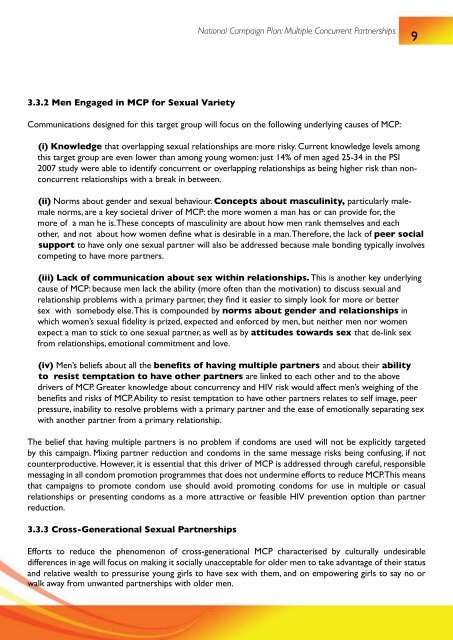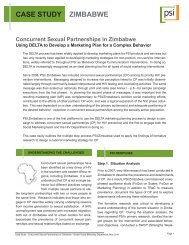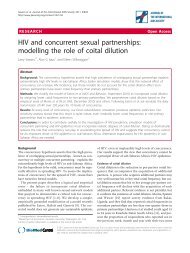O Icheke National Campaign Plan - CONCURRENT SEXUAL ...
O Icheke National Campaign Plan - CONCURRENT SEXUAL ...
O Icheke National Campaign Plan - CONCURRENT SEXUAL ...
- No tags were found...
You also want an ePaper? Increase the reach of your titles
YUMPU automatically turns print PDFs into web optimized ePapers that Google loves.
<strong>National</strong> <strong>Campaign</strong> <strong>Plan</strong>: Multiple Concurrent Partnerships93.3.2 Men Engaged in MCP for Sexual VarietyCommunications designed for this target group will focus on the following underlying causes of MCP:(i) Knowledge that overlapping sexual relationships are more risky. Current knowledge levels amongthis target group are even lower than among young women: just 14% of men aged 25-34 in the PSI2007 study were able to identify concurrent or overlapping relationships as being higher risk than nonconcurrentrelationships with a break in between.(ii) Norms about gender and sexual behaviour. Concepts about masculinity, particularly malemalenorms, are a key societal driver of MCP: the more women a man has or can provide for, themore of a man he is. These concepts of masculinity are about how men rank themselves and eachother, and not about how women define what is desirable in a man. Therefore, the lack of peer socialsupport to have only one sexual partner will also be addressed because male bonding typically involvescompeting to have more partners.(iii) Lack of communication about sex within relationships. This is another key underlyingcause of MCP: because men lack the ability (more often than the motivation) to discuss sexual andrelationship problems with a primary partner, they find it easier to simply look for more or bettersex with somebody else. This is compounded by norms about gender and relationships inwhich women’s sexual fidelity is prized, expected and enforced by men, but neither men nor womenexpect a man to stick to one sexual partner, as well as by attitudes towards sex that de-link sexfrom relationships, emotional commitment and love.(iv) Men’s beliefs about all the benefits of having multiple partners and about their abilityto resist temptation to have other partners are linked to each other and to the abovedrivers of MCP. Greater knowledge about concurrency and HIV risk would affect men’s weighing of thebenefits and risks of MCP. Ability to resist temptation to have other partners relates to self image, peerpressure, inability to resolve problems with a primary partner and the ease of emotionally separating sexwith another partner from a primary relationship.The belief that having multiple partners is no problem if condoms are used will not be explicitly targetedby this campaign. Mixing partner reduction and condoms in the same message risks being confusing, if notcounterproductive. However, it is essential that this driver of MCP is addressed through careful, responsiblemessaging in all condom promotion programmes that does not undermine efforts to reduce MCP. This meansthat campaigns to promote condom use should avoid promoting condoms for use in multiple or casualrelationships or presenting condoms as a more attractive or feasible HIV prevention option than partnerreduction.3.3.3 Cross-Generational Sexual PartnershipsEfforts to reduce the phenomenon of cross-generational MCP characterised by culturally undesirabledifferences in age will focus on making it socially unacceptable for older men to take advantage of their statusand relative wealth to pressurise young girls to have sex with them, and on empowering girls to say no orwalk away from unwanted partnerships with older men.










